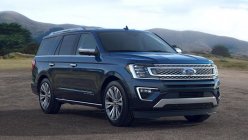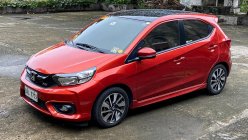The Honda Brio is the Japanese brand's contender in the Philippine subcompact hatchback segment. It has proven to be quite popular, and it has been one of the go-to models for people who are in the market for an affordable small hatchback powered by an inline-4 engine.
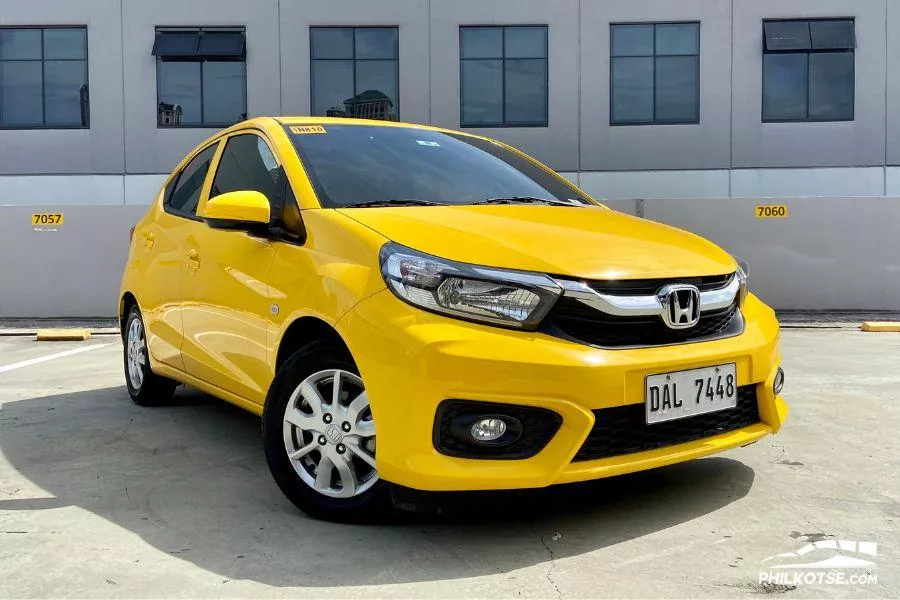
The Honda Brio V CVT
So, how is the Honda Brio’s fuel consumption? Well, let’s help you answer this question with this short guide. Because you know, fuel prices aren’t exactly great nowadays, isn’t it?
Honda Brio: Relevant specs
Before listing off fuel economy figures, let us first describe the Brio’s basic specs.
For engines, all four variants of the Philippine-spec Brio use a 1.2-liter inline-4 gasoline engine that can make up to 89 horsepower and 110 Nm of torque.
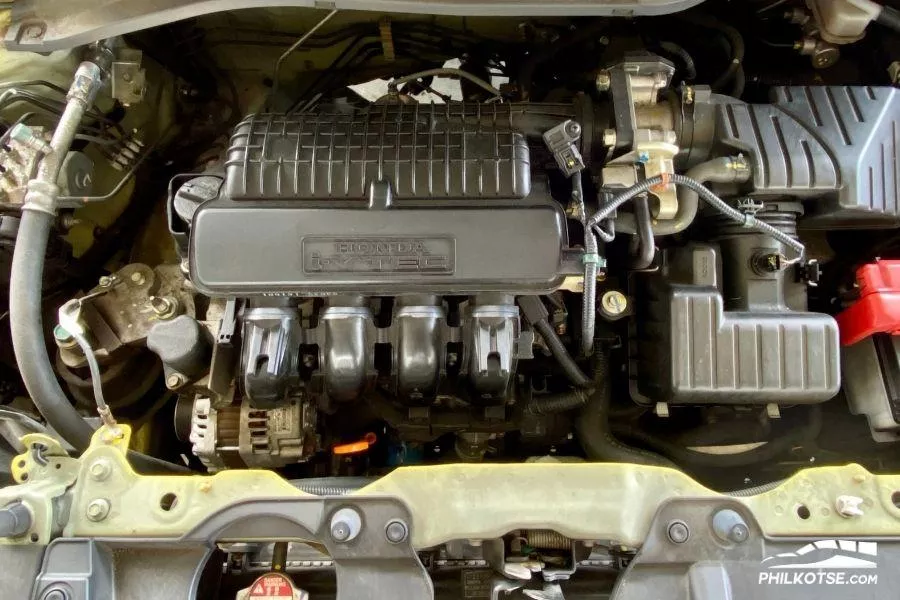
The Brio's 1.2-liter inline-4 gasoline engine
This four-banger is then paired with a five-speed manual gearbox, or a continuously variable transmission depending on the variant. Power is then sent to its front wheels. The said engine is also compliant with EURO 4 emissions standards.
In terms of curb weight, the manual versions of the Brio tip the scales at 954 kg. The CVT versions though, are a bit heavier with their curb weight of 969 kg. Size-wise, it has a length of 3,800mm, a width of 1,680mm, and a height of 1,485mm. It also has a ground clearance of 137mm, and a wheelbase length of 137mm.
While compact, the Brio can seat up to five occupants. It also gets some niceties like a seven-inch head unit, a reverse camera, power folding side mirrors, as well as an ample amount of safety features.
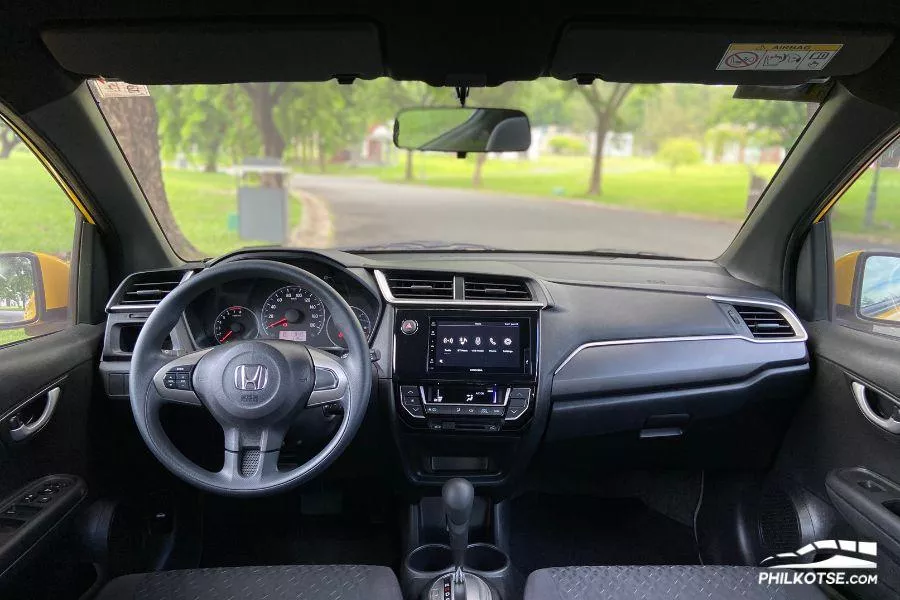
The Brio's well-arranged interior
As mentioned, the Brio is one of the few subcompact hatchbacks within its price range that is powered by an inline-4 engine. Others in this category of course include the Suzuki Swift, Chevrolet Spark, and Kia Picanto.
There are, of course, some other hatch models with inline-4 mills in the local market. These however, already breach the Php 1-million mark.
Honda Brio: Fairly efficient
We found out the Honda Brio’s fuel consumption in the Philippine setting by giving it a whirl here in Metro Manila.
The unit tested was the mid-spec Honda Brio V CVT, which has the same engine and the same 35-liter fuel tank capacity as the rest of the Brio variants.
In the city, the Brio managed to return 8 km/liter at an average speed of 30 km/h. Those numbers however, got even better when we took it on EDSA. There, it provided a fuel economy reading of 14.2 km/liter while traveling at 50 km/h on average.
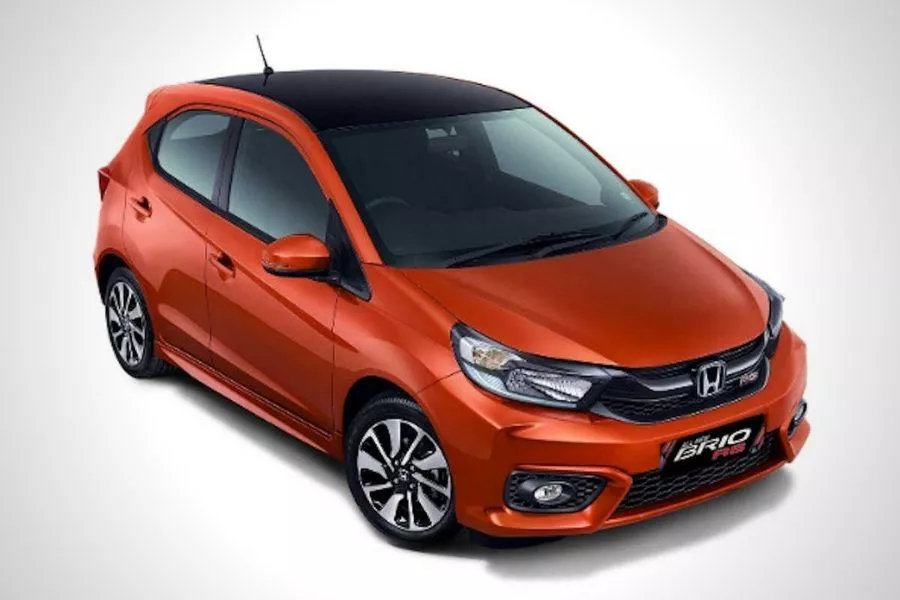
This is the top Brio RS Black Top, and it is priced at Php 735,000
Suffice to say, that isn’t bad for a car of its price and size. Do note though that we have yet to test it on the highway. We also didn’t get to test the manual transmission variants, and those might return a different fuel economy figure.
In general, the Brio’s gas consumption isn’t that bad. Then again, do note that inline-3 powered hatchbacks will arguably return better fuel eco numbers. For instance, the Suzuki S-Presso SE we reviewed and tested was able to deliver 16 km/liter in the city. The Brio though, will certainly make a bit more power than your typical inline-3 powered subcompact.
For more car buying guides and tips, keep it here on Philkotse.
Know more about Honda Brio 2026

The 2025 Honda Brio is the Japanese automaker's entry into the local hatchback segment. It is considered to be the small hatchback option with a price ranging from Php 735,000 to Php 883,000. The small hatchback is regarded as the entry-level vehicle of the Japanese carmaker. It is available in four variants, including a Black Top option for the top-of-the-line RS variant.
Under the hood, a 1.2-liter i-VTEC gasoline engine is standard across the range, delivering 89 hp and 110 Nm of torque. Depending on the variant, the engine can be paired to either a 5-speed manual or an Earth Dreams continuously variable transmission (CVT). The Brio Philippines offers dimensions that span 3,798 mm in length, 1,682 mm in width, and 1,487 mm in height. The RS trim is a bit longer at 3,811mm. Rivals in the hatchback segment include the Toyota Wigo, Kia Picanto, and Suzuki Swift.
2025 Honda Brio RS - Small Changes Adding Up | Philkotse Reviews
>>> New and used Honda Brio 2025 for sale in the Philippines
Honda Brio Launch
Honda Cars Philippines, Inc. launched the first-generation Honda Brio in the country during the Philippine International Motor Show in September 2014, three years after its debut in Thailand in 2011. It offered the local market a practical car due to its fair interior space, affordable pricing, and small 1.3-liter engine that produced 98 hp and 127 Nm of torque. These are the characteristics of an ideal vehicle for young individuals.
As for the current second-generation model, it didn't take as long before it arrived in Honda's local lineup in April 2019. The next-gen version comes with a sportier appeal thanks to its bolder character lines and the option for the RS variant which includes exclusive body kits that add sportiness and aggressiveness to the overall design. It is safe to say that the small hatchback is one of the best-looking vehicles in the local market for the price.
The facelift of the second-generation model then debuted for the local market on July 13, 2023. It was introduced with four variants: the RS Black Top, RS, V, and S.
Honda Brio Exterior
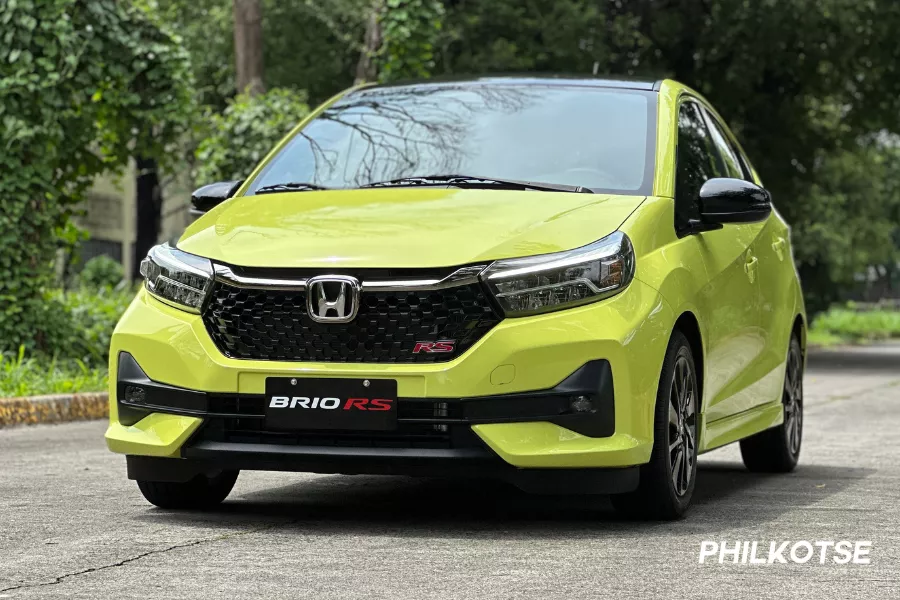
The Honda Brio features aggressive exterior details despite its relatively small size. Its 2025 update of the model features a bolder look compared to the pre-facelifted second-gen model.
Standard on the RS trim are LED headlamps, while the V and S trims get halogens. LED taillights are available for all variants. Other features present on the Brio, at least for the higher-spec trims are a power-folding side mirror, a tailgate spoiler, and LED fog lamps.
Honda Brio Interior
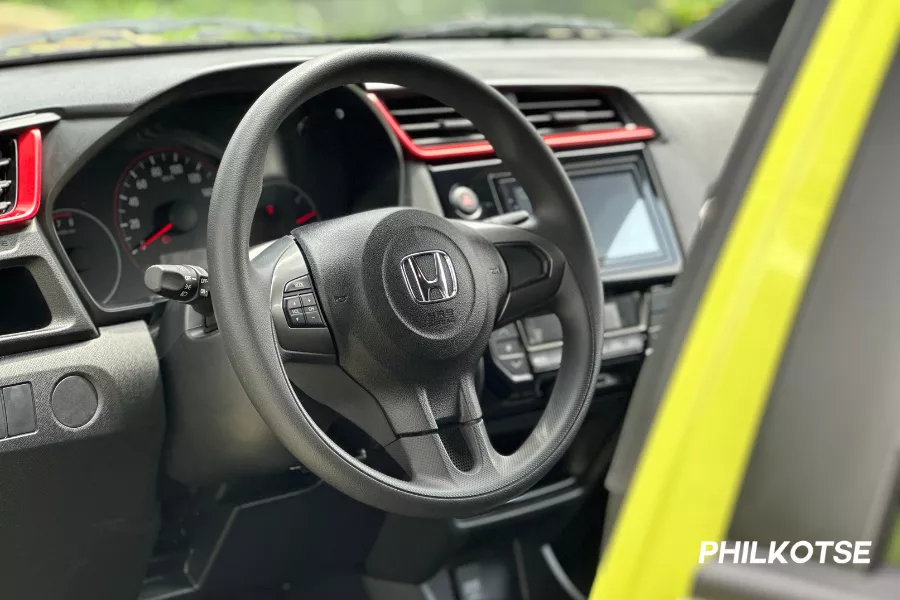
Inside, the Honda Brio gets a manual air-conditioning system as standard. The driver is then provided with an analog gauge cluster, a digital trip meter, a keyless entry system, etc.
All variants get fabric seats, but only the RS trim gets red accents. The RS versions are also the only ones that come with metallic inner door handles, a red-tinged interior trim, and an RS design speedometer.
Technology & Safety Features
Present on the RS and V trims of the Brio is a seven-inch headunit with Apple CarPlay and Android Auto. It is linked to a total of six speakers.
Handling this Honda-made hatchback safety meanwhile are dual-front airbags, anti-lock braking, rear parking sensors, and an engine immobilizer. Only the RS and V trims get a security alarm.
Platform & Chassis
The 2025 Brio carries over the front-engine, front-wheel platform used by the pre-facelift model. For suspensions, it uses a MacPherson strut for the front and a torsion beam for the rear. Braking is then handled by a front disc and a rear drum.
Honda Brio Engine & Drivetrain
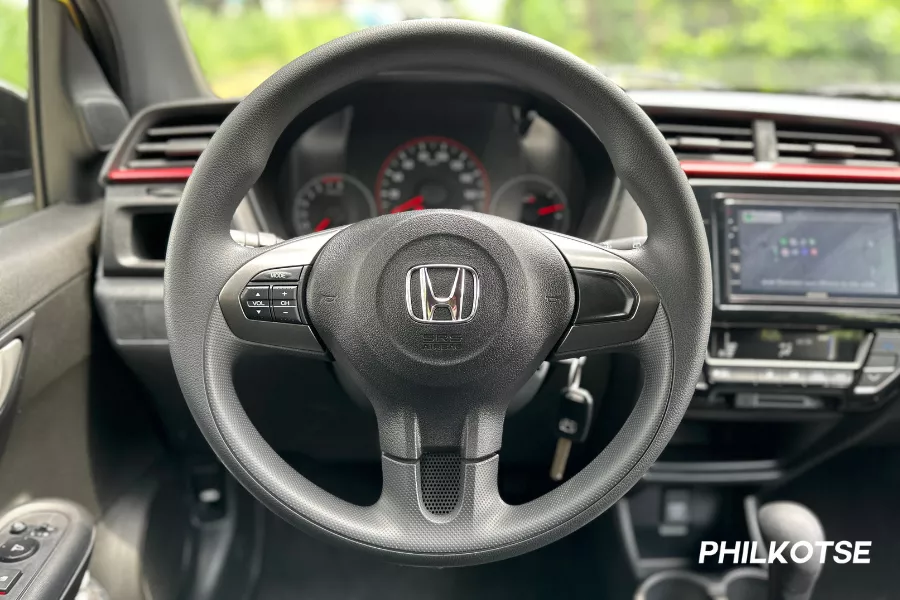
Honda decided to provide the Brio with a 1.2-liter engine that could churn out 89 horsepower and 110 Newton meters of torque. Power is sent to its front wheels via a continuously variable transmission or a 5-speed manual gearbox depending on the trim.
Honda Brio 2025 Price List
| Variants | Price |
|---|---|
| Honda Brio 1.2 S MT | ₱735,000 |
| Honda Brio 1.2 V CVT | ₱827,000 |
| Honda Brio 1.2 RS CVT | ₱853,000 |
| Honda Brio 1.2 RS Black Top CVT | ₱863,000 |
| Honda Brio 1.2 RS CVT (Stellar Diamond Pearl) | ₱873,000 |
| Honda Brio 1.2 RS Black Top CVT (Stellar Diamond Pearl) | ₱883,000 |
Honda Brio FAQs
1. How much is the Honda Brio 2025 Philippines?
Honda Brio 2025 price Philippines ranges from 735,000 PHP for the entry-level S 1.2 MT to 883,000 PHP for the top-of-the-line Honda Brio RS Black Top 1.2 CVT.
2. Is the Honda Brio available in CVT transmission?
Yes, the automatic variants of the Honda Brio come offered with Honda Earth Dreams Continuously Variable Transmission.
3. How many airbags does the Honda Brio have?
The Honda Brio is equipped with 2 airbags for the driver and front passenger.
4. Is the Honda Brio an SUV?
No, the Brio is a Hatchback.
5. What is the length of Honda Brio?
The length of Brio is 3,815mm.
₱ 735,000 - ₱ 863,000
ExploreRecent posts
- City sedan tops Honda Philippines 2021 sales Jan 27, 2022
- Honda Brio Promo January 2021 Nov 12, 2021
- Honda Cars PH Brio giveaway Nov 12, 2021


